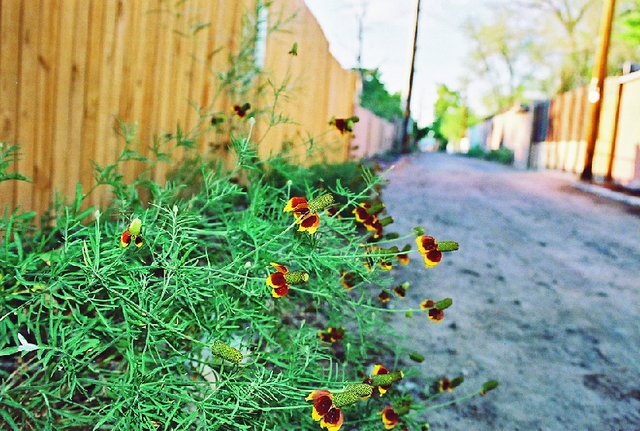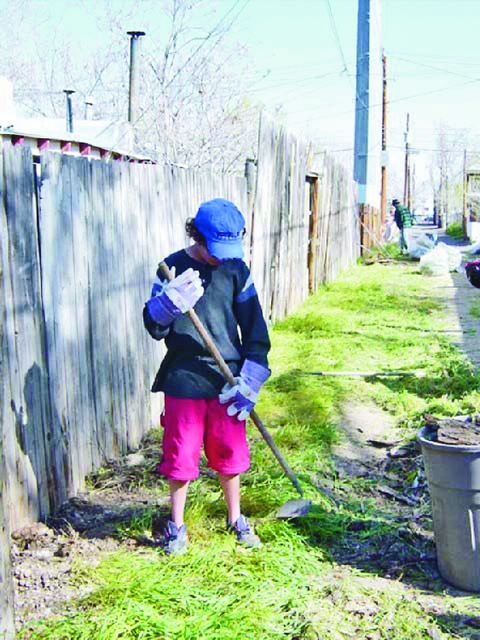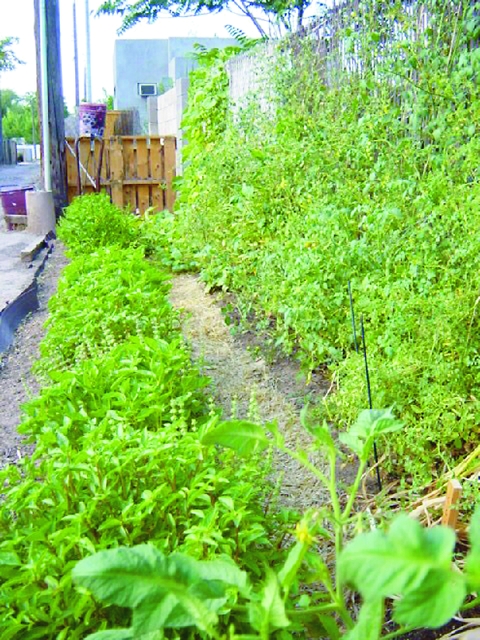Think about the forgotten spaces in your neighborhood—a park gone to pot, an empty lot, a rotting alley. Areas like these collect more than trash. The alley behind Amecus England’s Barelas home had become a hotspot for doing drugs, she says. "People were just shooting up all the time. I was finding needles. I would go to walk my dog and there would be all these needles."She heard about Alley Gardens, a group of green thumbs that transformed a bygone alley in Nob Hill into a lush plot of vegetation. "I thought, ‘This is perfect,’ a way to take it from a criminal center to a community center and make it actually productive."She called Paul Swegel, who founded Alley Gardens along with Crystal Scott. He came down and helped England plan her oasis. Five-hundred bucks out of her pocket later, she was growing, among other plants, cherry tomatoes—popular with kids who started entering the spruced-up alley to pick sackfuls. The more people used the space, the safer it became. With heavy foot traffic, dealers and addicts stopped using the Barelas alley for criminal activity. And as an added benefit, plant life also helps cool and oxygenate urban areas.Nobody in the Alley Gardens group is paid to do any of the work, which has amounted to a second full-time job for many of its members. Swegel’s able to get some seeds through his job as a landscaper. England got a few orphan plants, the unsellable seedlings on their last legs, for her garden. "We need to rely on multiple sources," says Swegel, who’s in the process of plotting the alley garden at Girard and Silver for a third year. Alley Gardens applied for a grant from the city’s Keep Albuquerque Beautiful organization. Swegel still hasn’t heard back, though England’s managed to nail down $200 for her Barelas garden. "We’ll have to canvass businesses and our mothers," Swegel says. Alley Gardens has really struggled, says Swegel. He and Scott were seniors at the University of New Mexico when they started Alley Gardens, and "we somehow thought grant money would just pour in, that we would be swimming through all this cash and really do this in a different way, but it hasn’t quite worked out." People come to them all the time, offering their gardening services and wondering if they could get paid to be part of the organization. "We’re like, ‘Sorry, you might actually have to put in your own money,’" Scott says.Alley Gardens would like to be a hub, a source for people interested in finding resources to start their own community gardens. Denver’s Urban Gardens functions that way, operating and assisting with more than 60 metro-area gardens. Neighborhoods organize themselves then get garden plans and information from the established organization, Scott says. It’s taken a lot of hours for the alley gardeners to install two-thirds of Nob Hill’s own Eden. Katie Doyle Smith, an urban farmer and Alley Gardens’ member, says the pilot garden’s changed over the last couple of years in terms of community involvement. "The project as it is, I’m going to go out here on a limb and say it’s not working. These guys work out at this alley every day pretty much, watering, taking care of somebody else’s garden." There are people in the city who want to garden, she says, and plenty who could care less about it. But most people warm to the idea of eating local food, veggies grown in their neighborhood. That’s why as Alley Gardens heads into its third season in Albuquerque, it’s kicking around the idea of a new relationship with the communities it works for. Modeled after community-supported agriculture farms in the North and South Valleys, such as Los Poblanos, the new system would ask a neighborhood to help financially support a farmer by purchasing vegetables. A farmer would be in charge of the garden, growing foodstuffs, and the residents would either pay a flat fee at the beginning of the season or a weekly rate for fresh veggies. The exact details haven’t yet been decided. "It’s a really cool way of growing a lot of awesome things," says Scott. "Plus, the plot’s right there behind your house. You know what’s been used on it. You’re not subject to gas price fluctuations." Until this season when England secured $200 for her Barelas garden, Alley Gardens hasn’t seen much in the way of financial support from city government. Swegel says he was under the impression Mayor Martin Chavez was going to fund the project when they began. "He suggested we bring him a budget and then never responded to it. I think he got a little nervous that we might just be college seniors and wanted to see if we could glide on our own." Though Alley Gardens never tried the mayor’s door again, members have opted to rally support from city councilors instead. "Even if our organization doesn’t benefit, we think the city would only do itself a favor by offering neighbors a few hundred bucks to get an alley garden started, rather than fining neighbors when they have weeds."It’s been difficult, says Scott, to figure out if an alley garden is even legal, though it has a definite positive benefit to the community it’s in. Alleys are funny spaces built originally for trash collection. It’s part private property, says Scott, and part city property, "so it’s kind of no-man’s land." After speaking to numerous branches of city government, Alley Gardens finally got permission from the city forester, Nick Kuhn, and from the city’s utility lines, as well. "We want to make it easier for other people to do it in the future, too," Scott says. "If other people get this idea, they can see what we’ve done and won’t have to jump through all these hoops to be able to do it."From the inception of Alley Gardens, the group’s had a vision in mind. Picture a series of gardens along the Central corridor, from Barelas to Nob Hill. "Almost all of those alleys are dirt, and nobody does anything back there," Swegel says. "It’s a nice idea to think about walking from Downtown to Nob Hill or vice versa and going through a series of gardens."
Stop by the Alley Gardens table at La Montanita Co-Op in Nob Hill on Earth Day, Sunday, April 22.







